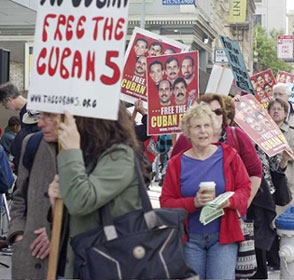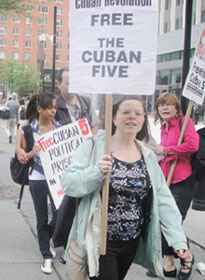|
The Militant will not publish next week. We will resume publication
with the issue dated July 13, 2009, which comes off the press July 2.
|
|
(lead article)
Actions demand: Free
5 Cubans in U.S. jails!
High Court refuses to hear frame-up case
 
|
|
Militant photos by Eric Simpson (left) and Tom Baumann (right)
|
|
June 16 picket lines in San Francisco, left, and New York, right, protest Supreme Court decision to not hear case of five framed-up Cuban revolutionaries locked up in U.S. prisons.
|
BY SETH GALINSKY
The U.S. Supreme Court on June 15 refused—without comment—to review the case of the Cuban Five. Supporters of the five Cuban revolutionaries responded to the decision by holding picket lines in several cities and are stepping up efforts to win the Five’s freedom. They have been held unjustly in U.S. jails for more than a decade.
Antonio Guerrero, Gerardo Hernández, Ramón Labañino, Fernando González, and René González, known internationally as the Cuban Five, have been jailed since 1998. A federal court in Miami convicted the five in 2001 on frame-up charges ranging from “conspiracy to commit espionage” to failing to register as agents of a foreign government. Hernández was also falsely accused of “conspiracy to commit murder.”
The five were monitoring counterrevolutionary Cuban American groups in Florida that have carried out violent attacks in Cuba with the complicity of the U.S. government.
“Based on the experience that we have had, I am not surprised by the Supreme Court decision,” Hernández said from prison in a statement released by Cuba’s National Assembly. “There are no longer any doubts that our case has been from the beginning a political case.”
The case is increasingly seen as an example of how the U.S. government uses the police and courts to attack the rights of working people. The FBI secretly broke into the five’s homes, copied documents, and listened in on their conversations. Unable to find any evidence they were “spying,” Washington brought trumped-up conspiracy charges against them.
The five were placed in the hole—solitary confinement—for 17 months before and seven weeks after their trial. They all continue to speak out from prison and to conduct themselves there as revolutionaries.
Attorneys for the five had filed the appeal with the Supreme Court on January 30. Twelve amicus curiae—friend-of-the-court—briefs were submitted to the court, backing the request that the case be reviewed.
Among those filing the briefs were the Mexican American Political Association, National Lawyers Guild, National Conference of Black Lawyers, Civil Rights Clinic at Howard University School of Law, and 10 Nobel Prize winners.
The briefs take up three main aspects of the more than six-month-long trial in 2001: the refusal of the trial judge to grant a change in venue despite pervasive anti-Castro prejudice in Miami, the dismissal by government prosecutors of seven potential jurors who are Black, and the conviction of Hernández without any evidence of conspiracy to commit murder.
The National Lawyers Guild and the National Conference of Black Lawyers note in their brief that on the very first day of jury selection anti-Castro rightists held a press conference and packed the courtroom. Similar intimidation occurred throughout the trial. In August 2005, the three-judge panel of the 11th Circuit Court of Appeals ruled that the sentiment against the Cuban Revolution among many in Miami, “extensive publicity both before and during the trial,” and “improper” statements by the prosecutors combined to create a “perfect storm” that made a fair trial for the five impossible. The court ordered a new trial. Its decision however, was overturned a year later by the full 12-judge court.
In refusing to review the case the Supreme Court “did what the Obama administration requested of it,” the Cuban National Assembly stated after the decision was announced. “We see manifested once more the arbitrariness of a corrupt and hypocritical system.”
“Now is the time to step up our actions and not leave one leaf unturned or one door unopened” in the fight to free the five, the assembly said.
Thirty people joined a picket line in front of the White House soon after the decision was announced, shouting “Justice delayed is justice denied! Free the Cuban Five now!”
The protesters demanded that President Barack Obama pardon the five. Other protests were held in San Francisco and New York City.
“As long as one person remains struggling outside, we will continue resisting until there is justice,” Hernández emphasized in his statement.
Susan LaMont in Washington, D.C., contributed to this article.
| 


